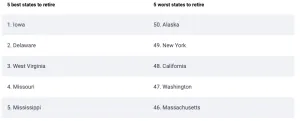(Bankrate) To move or not to move when you retire? That’s the big question.
Picking a place to retire is one of life’s most consequential decisions — and ultimately, a deeply personal choice. You may want to settle down by the beach or in the mountains. Maybe you prefer golf over cross-country skiing, or you just want to be near your kids or grandkids. With all these possibilities in front of you, you may not know where to start.
To find some objective answers to the where-to-retire question, Bankrate crunched a bevy of statistics on costs of living, public health and other metrics to create a comprehensive ranking of the best and worst states to retire in the U.S. We analyzed five broad categories across all 50 states: affordability, overall well-being, the cost and quality of healthcare, weather and crime.
The category that we weighed the heaviest was affordability, to reflect the challenges that so many Americans face in today’s economy. The housing market remains competitive, with high borrowing costs, expensive housing prices and low inventory. At the same time, inflation has rocked Americans’ wallets over the last two years, leaving many feeling behind on their retirement and looking for ways to stretch their savings.
It’s important to note our ranking is simply a starting point for making a decision. If you own a paid-off home in a high-cost area like Boston or Los Angeles, maybe affordability isn’t your priority. And, of course, not everyone likes the sweltering summers of the Sun Belt states.

Best and worst states to retire in 2023
The common narrative is that retirees leave colder or high-cost states such as New York, New Jersey and California for traditional retirement destinations with warm weather, a relatively low cost of livingand other perks for seniors. And while that continues to be the case in 2023, experts say older Americans shouldn’t rule out places that aren’t traditionally top of mind for retirement.
Bankrate’s latest study found that Iowa is the best state for retirement, followed by Delaware, West Virginia, Missouri and Mississippi. Alaska, on the other hand, held last place in our ranking. The state was dragged down by back-of-the-pack scores in affordability and weather. In addition to Alaska, the remaining four worst states for retirement were New York, California, Washington and Massachusetts.

Why Iowa is the best state to retire
You may be wondering: Why Iowa? With its vast farmlands, peaceful countryside and friendly locals, Iowa offers a unique retirement experience for many Americans seeking a more relaxed and affordable lifestyle with access to the outdoors and retirement-age communities.
Iowa’s affordability is a big draw for retirees. Iowa is the sixth cheapest place to live in the U.S., according to the Council for Community and Economic Research, which is an advantage for retirees on a fixed income. Lower housing costs also helped prop the Hawkeye state up to the No. 3 spot for affordability. Iowa’s median home price is $239,400, per Redfin data — well below the nationwide median home price of $388,800. Homeowners insurance in Iowa is also below the national average.
Iowa lands near the middle of the pack tax-wise. The state ranks No. 23 for property taxes and No. 22 for state and local sales tax. Iowa also doesn’t tax Social Security benefits, and Iowans age 55 and older are exempt from paying state taxes on retirement income for tax year 2023. The state also topped our ranking for its high-quality healthcare services and low healthcare costs.
If you’re looking for retirement-age friends, you’ll have a good chance of finding them in this state as well, where nearly 20 percent of the population is age 65 and older, Census data shows.
Meanwhile, for potential retirees seeking a cultural melting pot and warm weather, Iowa may not be a good choice. It ranks poorly for racial and ethnic diversity, and its community-well being index is subpar. It also is generally colder in Iowa and has a high incidence of tornadoes, which may not be appealing for many retirees.
But it’s not just Iowa at the top of the list. The rest within the top five are:
- Delaware: For retirees considering a move to Delaware, well-being is a big selling point. The state combines high-quality healthcare and a light tax burden to rank No. 2 overall. Diversity, wellness and culture are other strong points. The state ranks near the top for racial and ethnic diversity, arts and entertainment establishments per capita and wellness. It also has one of the nation’s highest percentages of over-65 residents. Earthquakes, tornados and hurricanes are rare — and it places in the middle of the pack in our rankings for both cost of healthcare and crime. The state’s only weaker spot is in the affordability category — this East Coast state ranks No. 31 for cost of living.
- West Virginia: This small state seems an odd choice for the top five, but West Virginia boasts the best affordability in the nation, based on a low cost of living and light tax burden. The state fell in the middle of the pack for wellness, placing No. 26 in that category.
- Missouri: Fourth-place Missouri shines for affordability, but struggles with its quality of healthcare, crime and natural disasters.
- Mississippi: Another Sun Belt surprise, Mississippi scored well on affordability, weather and crime but suffered in two other key categories, healthcare and overall well-being.






